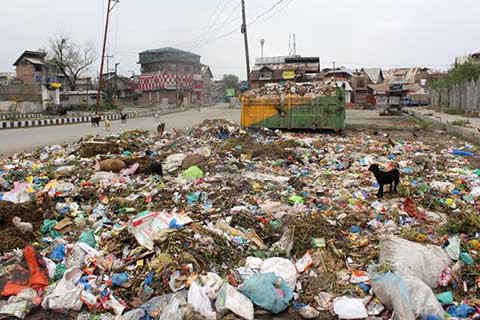The role played by solid waste collection and its scientific disposal in ensuring cleanliness and sustainability drive is too important to be described in words. When small cities across the country with less or equal means can show better and enviable results in management of solid waste, why should Jammu and Kashmir with reasonably better means not be in a position to perform well. ‘Excelsior’ has been regularly raising voice on this vital issue which is directly linked to and has considerable effect on the health of the citizens, environment and pollution of air and water. Our ULBs with better means are found wanting in evolving a foolproof mechanism in the solid waste management so that patch -work approach and temporary measures in its disposal rather dumping here and there wherever some secluded idle sites are found, was totally stopped. Proper collection, storage, transportation, treatment and disposal of solid waste which is generated on day to day basis still eludes a permanent resolution on the ground.
Should, therefore, some standard by-laws govern and guide the proper management of the solid waste and should those be universally made applicable across the UT of Jammu and Kashmir involving ULBs, Panchayats, Municipal Councils, Development Authorities and others. On these lines, action at last seems to have been taken in the form of the Government notifying the Model Solid Waste Management by-laws. Not only this, the High Court has directed notifying and adopting these by-laws by Local Bodies and all concerned. The court has sought information from all concerned including from the UT Ladakh whether they have notified the said by-laws or not thus significance and importance is duly lent to the issue. Since Tourism Department in overall management of the tourist destinations in the UT and its various units are directly connected to management of the solid waste, it must now look and act adopting these by-laws for implementation. In other words, monitoring of the entire issue by the High Court shall hopefully leave no scope for adopting any more of a lackadaisical approach.
All local authorities, urban and rural, are now bound not only to adopt these by-laws but file reports on implementation before the court in respect of the solid waste management including the collection and treatment of medical waste. We reiterate that very little scope is now left with the concerned Urban Local Bodies to camouflage and manipulate disposal not to speak of its stage from collection to transportation to the disposal sites. We had suggested for mooting an intense coordination between all stake holders, Authorities, Departments including the Finance Department in sorting out difficulties and resolving those on the spot so that proper waste management techniques could be adopted all in the interests of environment and general public health. Now, with notifying and adopting the by-laws and by close monitoring by the High Court, the issue must be handled in a professional way on daily basis.
Segregation of waste material as for example in Indore which got top ranking in this year’s cleanliness campaign, is important for purposes of recycling and conserving environment. Recycling can entice interest in the prospective entrepreneurs to recycle things from out of the segregated waste material and cause that to be sold in the market thus opening employment opportunities too. Other part separately segregated right from the originating or collecting point can be turned into manures for our agricultural needs through composting techniques while yet another, ie, the waste gas can be ‘captured’ and used for generating electricity and heat. Let solid waste management no longer continue to remain an ongoing challenge. The institutions set up to look after and manage the solid waste need to rejuvenate their line of action in compliance of the notified and adopted by-laws.
Trending Now
E-Paper


